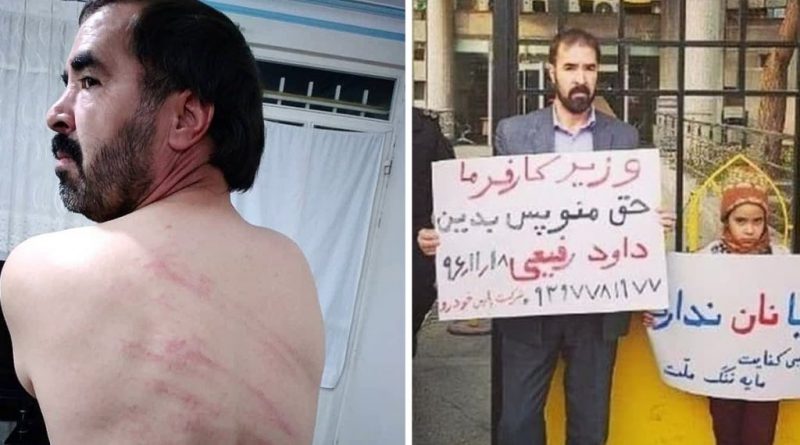Iranian worker lashed 74 times without prior notice or judicial sentence
Tehran (IranNewsWire) – A worker was lashed 74 times without prior notice or a confirmed judicial sentence in Tehran’s Evin Prison.
The worker identified as Davoud Rafie, was laid off from the Pars Khodro automobile manufacturing company in 2012 for taking part in labor protests.
He was later detained in 2016 along with two other workers.
After the Minister of Cooperatives, Labor and Social Welfare filed a complaint against him, he was once again detained in 2018 and was later released on bail.
When Davoud Rafie went to the court in Evin Prison to pursue his case, he was detained by agents and lashed him 74 times.
The flogging sentence was carried out even though Rafie’s charge of “insulting the Minister of Labor” had yet to be confirmed by the Supreme Court.
Rafie had participated in several protests outside the Ministry of Labor holding a sign which read “down with the Minister of Labor”, who was Ali Rabiei at that time.
Rabiei had withdrew his complaint in a formal letter to the Tehran Judiciary in April 2019.
Earlier this week, a man in Naqadeh, northwestern Iran was flogged, for “insulting” a judge. Mehdi Khairi was flogged 35 times in the Sentence Implementation Unit of the Mohammadyar Public Court. He was tried in absentia by the Court in July. An informed source said Khairi got into an argument with a judge presiding over a lawsuit he had filed.
Iran’s use of degrading punishments and torture
The Iranian regime is one of the few states that still uses degrading punishments, even though all international civil and political rights conventions have prohibited the use of inhumane punishments such as execution and flogging.
The regime regularly hands out flogging sentences to protesters, dissidents, and to those charged with adultery and theft, among other things. Flogging is a cruel and degrading punishment and is tantamount to torture.
According to Amnesty International’s Philip Luther, “The use of cruel and inhuman punishments such as flogging, amputation, and blinding are an appalling assault on human dignity and violate the absolute prohibition on torture and other degrading treatment or punishment under international law.”
“As a party to the International Covenant on Civil and Political Rights, Iran is legally obliged to forbid torture and other cruel, inhuman and degrading treatment or punishment. It’s simply unacceptable that the Iranian authorities continue to allow such punishments and to justify them in the name of protecting religious morals,” he said in July 2018 in a statement condemning the lashing of a young man for drinking alcohol.
More than 100 “offenses” are punishable by flogging under Iranian law. The offenses include theft, assault, vandalism, defamation, and fraud. They also cover acts that should not be criminalized, such as adultery, intimate relationships between unmarried men and women, “breach of public morals” and consensual same-sex sexual relations.



